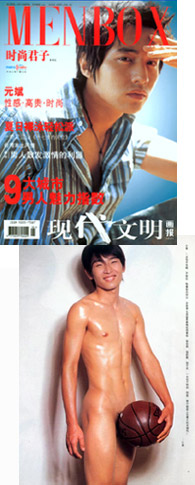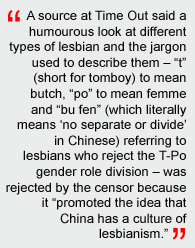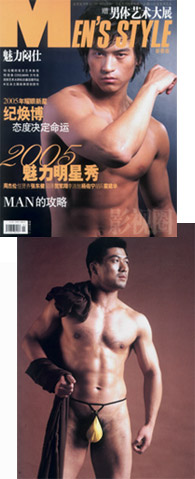In September, the state-owned Beijing Today, a weekly English-language newspaper published in the Chinese capital, carried a front page story on a secret lesbian club that aimed to fight for acceptance and equality for women who love women.

Menbox, May 2004 issue
For years, observers say, China's media has been bound by the three no's - no approval, no disapproval and no promotion of homosexuality.
Lesbian activist and social worker, Xian, says she was privy to a confidential government memorandum to the media a few months ago listing taboo topics. "Homosexuality was still on the list of subjects not to be promoted," she says.
But the state-controlled Beijing Today feature, headlined, "We are just the same" carried a subtle call for the public to accept and respect lalas, a commonly used euphemism to refer to lesbians.
"Ding explodes the myth held by many narrow minded Chinese that lesbians are masculine and freaks of nature," the article runs.
"She is pretty, feminine and a head turner of both sexes."
The feature is just one of many similarly angled stories carried in state-owned magazines, newspapers and TV documentaries over the past few months.
Since this summer, there have been a slew of editorials in the China Daily calling for more tolerance for sexual minorities - even one, headlined "Media must rethink AIDS coverage," which urged the press to stop stigmatising gay men as all being carriers of HIV.
"30 million - the troubles of China's homosexuals" was the front-page splash in an August edition of the Chinese-language current affairs magazine, Globe, run by the official Xinhua news agency. It examined the problems of discrimination against gays and clearly called for the public to become more tolerant and accept gays as "normal and equal."
Also in August, Time Out, an English language listing and entertainment magazine, won a long running battle to get permission to publish a gay and lesbian page.
Nobody at Time Out would officially comment on how they got the go ahead to run the page but a source at the magazine said we: "always hope that the media products we produce will help to make China a more open society, and being able to have a gay section is one of those steps. However, in order for us to be effective (we) prefer to do it without the noise."
In the nineties, says Xian, there was almost no media coverage of homosexuality.
By the end of the decade, she adds, gays started to appear in crime stories such as the 2000 stabbing of pop star Mao Ning, allegedly by his rent boy lover.
Then the media began linking gay men and AIDS.
"A few years ago with the government more open about the HIV/AIDS problem journalists started to cover AIDS stories, and gays were highlighted here as a high risk group."
So the latest shift in the media's attitude to homosexuality is very encouraging, Xian says.
"The whole gay community is talking about this media explosion. It's very exciting."
The watershed was a CCTV documentary, broadcast nationally, called New Investigation on HIV and AIDS, earlier this year, which, while linking gay men with the virus, portrayed homosexual love sensitively, she says.
For the first time, says Xian, gays were shown as human beings with emotions and involved in real relationships.
That CCTV documentary, "opened a lot of doors to the media to cover gay issues," says an editor for a state-owned newspaper who asked not to be named.
He says media are beginning to cover homosexual issues more sensitively because gays and lesbians are no longer underground; they are becoming more visible and a growing presence in Chinese society.
"China is becoming more and more open, and people can accept more different kinds of lifestyles," he says.
These kinds of articles would not be possible a few years ago, he says. And while there has been no specific directive from the government to cover or ban these stories, the media is beginning to slowly test the limits itself.

But "It's a kind of open secret that these stories should be covered carefully," he adds.
"We still can't promote the homosexual lifestyle or write something that calls too strongly for acceptance."
A source at Time Out said a humourous look at different types of lesbian and the jargon used to describe them - "t" (short for tomboy) to mean butch, "po" (婆, mainly used to refer to a female role such as wife) to mean femme and "bu fen" (不分, which literally means 'no separate or divide') referring to lesbians who reject the T-Po gender role division - was rejected by the censor because it "promoted the idea that China has a culture of lesbianism."
But Xian believes it is because the government is serious about controlling HIV/AIDS and wants to get the support of the gay community.
"The government is determined to tackle AIDS and without the support of the gay community it's going to be very, very hard to do this kind of AIDS prevention," she says.
Wan Yanhai, founder of Aizhi Action Project, a Beijing-based NGO which promotes HIV/AIDS awareness and prevention, agrees with Xian but added the government was also responding to a growing gay and lesbian social movement.
"I think the change in the media over the past 12 months or so is a kind of response to several issues - a growing gay and lesbian community as well as the growing health crisis in the gay community," he says.
"There is a lot of interaction between gay groups in China and the international community - international NGOs, UN agencies and international media. The government is not stupid. They understand the importance of supporting a growing community and helping it to develop its self identity."
The government understands that it must begin to open up, says Wan, or it will lose control of the social movement and the AIDS health problem in the gay community will become more serious.
Dr Wan was expelled from his government post of health official in 1994, after he promoted equal rights for gays and lesbians and supported AIDS awareness. He was also detained in 2002 for about a month after he released data on HIV sufferers in Henan province who caught the virus from a blood donation scam.
Observers say in the past year or so gay groups have been allowed to exist provided they focus on promoting safe sex and AIDS prevention.
"Before gay groups were underground, but last year the government started to open talks with some of them," Xian says.
The government really started to take action after the SARS crisis in 2003, she says, adding the government is afraid of an AIDS explosion among the gay community.
According to Dr Wan, the HIV infection rate among gay Chinese males is much lower than in the west, although he said knowledge of safe sex was very poor especially among urban gay men. He attributes the fairly low infection rates in the countryside to gays in remote rural areas not practicing homosexual sex.
Observers say in the past year or so gay groups have been allowed to exist provided they focus on promoting safe sex and AIDS prevention.

Men's Style, Feb 2005 issue
The government really started to take action after the SARS crisis in 2003, she says, adding the government is afraid of an AIDS explosion among the gay community.
According to Dr Wan, the HIV infection rate among gay Chinese males is much lower than in the west, although he said knowledge of safe sex was very poor especially among urban gay men. He attributes the fairly low infection rates in the countryside to gays in remote rural areas not practicing homosexual sex.
The infection rate may be as high as five percent among urban gay males, he says.
The UK-based AIDS and HIV charity, AVERT, quoted a 2003 study published in The Lancet which found that while HIV prevalence was low among gay men in Beijing, around half of the men surveyed regularly had unprotected sex. The study predicted this could lead to a significant rise in the HIV infection rate without efforts to engage the gay community and educate them about safe sex.
"There is little concept of safe sex and no access to condoms in bars and saunas," says Dr Wan, adding because of the health department's ban on promoting sexual AIDS, clubs and saunas do not have to provide condoms to their customers.
"Guys here are almost always willing to have sex without a condom," says Edward, a British gay male based in Beijing. "They don't have a knowledge of sex safe."
"(Gay) saunas are filthy here - there's grime on the tiles, roaches everywhere. They give you paper knickers and a small towel when you go in; they sell coke and instant noodles; but there are no condoms anywhere."
Same-sex relationships and acts are not illegal in China, but it was only in 2001 that it removed homosexuality from its list of mental disorders. Many people in the countryside continue to believe being gay is a disease.
The situation in the cities is a lot better. Beijing, Shanghai and some other large cities have gay and lesbian bars and it is common to see same sex couples in certain districts. And while there is not a culture of gay bashing in China as there is in some parts of the west, there pervades a "look the other way" tolerance. Many gays and lesbians never come out to their parents, and often end up getting married to please their families.
There are dozens of Chinese-hosted gay and lesbian websites, although the government periodically bans some during crackdowns on pornography. There is also a range of local men's magazines, such as Menbox and Men's Style, targeted at gay men although not specifically marketed as gay, published in the country. Even state-owned Xinhua branched out into homoerotica on its website last month with naked pictures of model Hu Bin.
The icing on the cake for the gay community, however, came in September, when Shanghai's prestigious Fudan University began offering an undergraduate course in gay studies, which was widely reported by the domestic press.
According to Chinese media reports, it is the first time a Chinese university has offered such a course to non-medical graduates.
Wan says, "The course marks a big progress towards gay issues. It's important to have intellectuals and scholars to publicly talk about homosexuality."
"The new course at Fudan is a major breakthrough because for the first time it's focusing on the culture of homosexuality and not just about AIDS," says Xian. And she adds, it's more evidence of a changing government attitude to homosexuality.
"The government must know and they must approve."
With a broad grin across her face, Xian adds, "We hope that next year there will be big changes in China for gays and lesbians. We are really hoping for policy changes."
And while a mass pride event is unlikely to be on the cards anytime soon, red China appears to be making the moves to incorporate some shades of pink.











 Printable Version
Printable Version










Reader's Comments
Be the first to leave a comment on this page!
Please log in to use this feature.